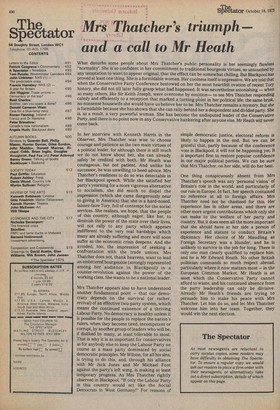What disturbs some people about Mrs Thatcher's public personality is
her seemingly flawless "normality'. She is so confident in her commitment to traditional bourgeois virtues, so untouched by any temptation to want to appear original, that the effect can be somewhat chilling. But Blackpool has proved at least one thing. She is a formidable woman. Her coolness itself is impressive. We are told that when the Conservative Party Conference bestowed on her the most heartfelt ovation of recent Tory history, she did not till later fully grasp what had happened. It was nevertheless astonishing — when so many others, like Sir Keith Joseph, were overcome by emotion— to see Mrs Thatcher responding calmly and efficiently to a reception that marked a turning pOint in her political life: the same brisk, no-nonsense housewife she would have us believe her to be. Mrs Thatcher remains a mystery. But she is formidable because she has shown that she can rally behind her a despondent and divided party. She is, as a result, a very powerful woman. She has become the undisputed leader of the Conservative Party, and there is no point now in any Conservative hankering after anyone else. Mr Heath will never come back.
In her interview with Kenneth Harris in the Observer, Mrs Thatcher was wise to choose courage and patience as the two main virtues of a political leader, for although there is still much we do not know about her, she can already safely be credited with both. Mr Heath was courageous, but not patient. And unlike his successor, he was unwilling to heed advice. Mrs Thatcher's readiness to do so was detectable in her Blackpool speech. While she satisfied her party's yearning for a more vigorous alternative to socialism, she did much to dispel the impression (which she came dangerously near to giving in America) that she is a hard-nosed, laissez-faire Tory, full of contempt for the social services. She realises, we hope, that the people of this country, although eager, like her, to diminish the power of the state over their lives, will not rally to any party which appears indifferent to the very real hardships which many are already suffering and more will soon suffer as the economic crisis deepens. And she avoided, too, the impression of seeking a confrontation with the trade unions. Mrs Thatcher does not, thank heavens, want to lead an embittered bourgeoisie (strongly represented among her audience in Blackpool) in a counter-revolution against the power of the working class. She wants to be a national leader.
Mrs Thatcher appears also to have understood another fundamental point — that our democracy depends on the survival (or rather, revival) of an effective two-party system, which means the continued existence of a thriving Labour Party. No democracy is healthy unless it is possible for the people to replace the nation's rulers, when they become tired, incompetent or corrupt, by another group of leaders who will be, if disliked by many, at least tolerable to most. That is why it is as important for conservatives as for anybody else to keep the Labour Party on course as a mass party dominated by social democratic principles. Mr Wilson, for all his sins, is trying to do this, and, through his alliance with Mr Jack Jones and Mr Michael Foot against the party's left wing, is making at least temporary progress. As Mrs Thatcher rightly observed in Blackpool, "If only the Labour Party in this country would act like the Social Democrats in West Germany!" For reasons of simple democratic justice, electoral reform is likely to happen in the end. But we can be grateful that, partly because of the conference vote in Blackpool, it will not be happening yet. It is important first to restore popular confidence in our major political parties. We can be sure that Mrs Thatcher, on her side, will do her best.
One thing conspicuously absent from Mrs Thatcher's speech was any 'personal vision' of Britain's role in the world, and particularly of our role in Europe. In fact, her speech contained no reference at all to foreign affairs. Mrs Thatcher need not be chastised for this. Her experience lies in other areas, and there are other more urgent contributions which only she can make to the welfare of her party and country. But it does seem all the more important that she ahould have at her side a person of experience and stature to conduct Britain's diplomacy. Her choice of Mr Maudling as Foreign Secretary was a blunder, and he is unlikely to survive in the job for long. There is only one man clearly qualified to replace him, and he is Mr Edward Heath. No other British politician commands so much respect abroad, particularly where it now matters most — in the European Common Market. Mr Heath is an asset which the Conservative Party cannot afford to waste, and his continued absence from the party leadership can only be divisive. Already Mr Heath's friends are trying to persuade him to make his peace with Mrs Thatcher. Let him do so, and let Mrs Thatcher welcome him into her team. Together, they would win the next election.


































 Previous page
Previous page